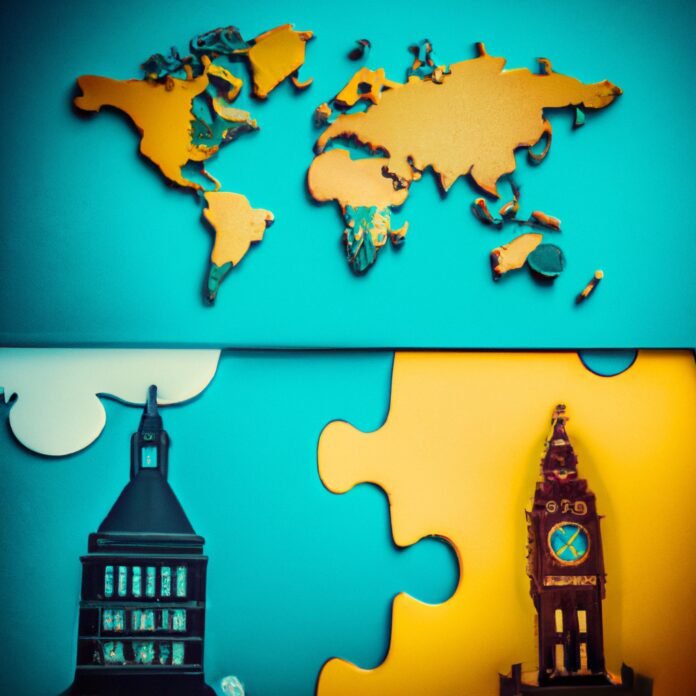Exploring the world doesn’t have to be done alone, and yet an increasing number of travelers are choosing to embark on solo trips abroad. By going solo, travelers can better absorb the culture and cultural exchange that takes place in these foreign countries. In this article, we will explore the ways in which going solo when traveling can foster intercultural exchange, open up new perspectives, and even build connections with locals and other travelers alike. Read on to learn more about the incredible potential of taking a solo-trip abroad.
1. Discovering Yourself Through Solo Travel
Solo travel has long been a rite of passage for individuals who are seeking personal growth. Without the comfort of friends or family, travelers must rely on their own devices to find success. Self-discovery can be a thrilling adventure and a key part of personal growth and development.
The healing power of nature is a key aspect of . You have the opportunity to disconnect from all the hustle and bustle of life and to reconnect with your inner values and aspirations. Going on a journey into the wilderness allows you to discover yourself in a completely new environment.
Engagement with the cultures of a geographic region can be a defining aspect of solo travel. Meeting with locals and other travelers in your destination can be an eye-opening experience. The values, beliefs, and social customs of a culture can provide a new lens for viewing your own life. From visiting local spiritual sites to taking part in cultural activities, you can gain insights from a cultural experience that you would not be able to achieve elsewhere.
In a sense, solo travel can be a form of internal exploration. During this journey, travelers can take stock of their values and understand their needs on a deeper level. Whether it is uncovering hidden talents or delving into unresolved feelings, solo travel can be a fruitful endeavor for those seeking self-discovery.
- Explore the natural environment
- Engage with vibrant cultures
- Internal exploration
2. Reaping the Benefits of Intercultural Exchange
Intercultural exchange is essential in today’s world, and doing it correctly brings you countless rewards. Here are some of the top advantages of engaging in global intercultural exchange.
- Deeper understanding of different cultures — Through intercultural exchange, you gain a more comprehensive understanding of different cultures, religions, values, political systems, lifestyles, and many other aspects. This opens up a range of opportunities, including the ability to tap into different markets, understand the customs of other people, and even strike up unique partnerships and collaborations.
- Personal growth — Partaking in intercultural exchange gives you a huge opportunity to grow as an individual. Encountering different cultures, beliefs, and ways of life put your skills of self-reflection, resourcefulness, and adaptability to the test. You can also benefit from interacting with people who can teach you new things or help you hone those skills.
- More job opportunities — Employers these days are looking for people who can bridge cultural gaps and understand the needs of different markets. Having a solid understanding of different cultures and different markets can give you an advantage in the job market and can open the door for new opportunities.
- Improved communication skills – Taking part in global intercultural exchange helps you develop practical language and communication skills. Meeting different people from different backgrounds and cultures gives you the chance to learn new expressions and even pick up new languages. This provides you opportunities to communicate better with a wide range of people around the world.
Intercultural exchange is a crucial characteristic of globalization; what’s more, understanding and taking advantage of it can only enhance your experience of it. Embrace the opportunity to exchange and benefit from different cultures.
3. Exploring Beyond Your Comfort Zone
Every day offers opportunities to explore beyond our comfort zones. From trying a new activity or connecting with someone from a different culture, these courageous actions can spark a positive ripple effect with surprising results. Here are three examples of how to go out of your comfort zone:
- Travelling – jet suffering from agoraphobia and hit the open skies. Take small trips to experience how local people live in another town or city. Explore a different climate and culture. The rewards can be amazing, even for short excursions.
- Socializing – strike up a conversation with a stranger in line at the store. Break down barriers by introducing yourself to an individual from a different cultural or social group. It may be uncomfortable or awkward at first, but it can open up new avenues of thought and exchange.
- Learning – Take a class that you never thought would be possible and challenge yourself to gain a deeper understanding of it. Learn a new language and be exposed to a different way of communicating. Invite someone to show you something you have never seen before and explore their expertise.
By challenging ourselves to go beyond our comfort zones, we are more likely to be exposed to unique opportunities to grow. It can be therapeutic to face our fears and anxieties. We can gain respect and admiration from those around us and discover our hidden potentials or passions.
We can even surprise ourselves with how capable we really are. By allowing ourselves to explore, we realize we may not have been aware of what our capabilities are. It brings an element of excitement to a mundane life and by trying new things, we can build greater self-confidence.
4. Building Deeper Connections with Foreign Cultures
Experiencing different cultures first-hand is an incredible way to learn and understand both the similarities and differences from your own culture. With the right approach and attitude, it’s possible to build relationships on a deeper level and explore the different facets of a culture.
It’s best to begin by actively listening and engaging in conversations. This helps to understand a culture’s history and how it relates to current events. By getting to know a culture’s language, even on a basic level, it helps to create a stronger connection. This is a great way to gain insight into the cultural nuances and prepare for the cultural exchanges that will come with building relationships.
When spending time with those from another culture, make sure to observe their etiquette with respect. This includes simple gestures of politeness such as removing your shoes in the home of someone from certain cultures or paying respect to the elders. Understanding these gestures is an essential part of building deeper connections.
Be curious and open-minded: Be genuinely interested in learning about the cultures and engage in conversations in order to gain deeper insights. Although cultural differences are inevitable, these can be navigated with respect for both parties.
Celebrate cultural holidays: Celebrate the different cultural holidays and festivities with your newly acquired friends. This is a great way to participate in the local customs, learn from traditional customs and make lifelong connections.
Embrace cultural traditions: By fully engaging with a culture’s customs such as eating traditional dishes and participating in traditional activities, it’s possible to gain a greater appreciation for the culture’s history and create deeper connections.
- Be curious and open-minded
- Celebrate cultural holidays
- Embrace cultural traditions
Travelling solo can be intimidating, but the experiences that come from it are invaluable. Ultimately, solo travelers are exposed to moments that can only be experienced through intercultural exchange. When you reach your destination, don’t forget to leave your safety net behind to bring your language, culture, and worldview out into the world. In doing so, you will make connections that will stay with you for a lifetime.


